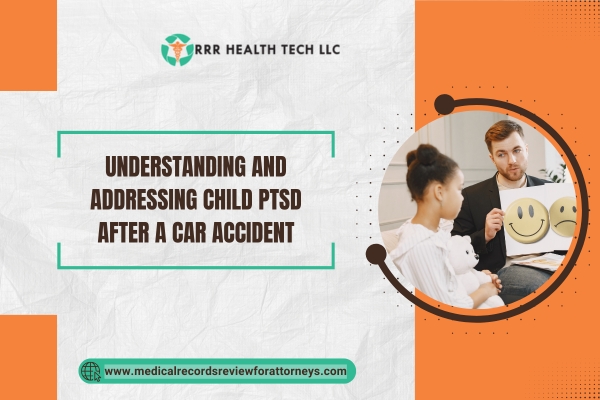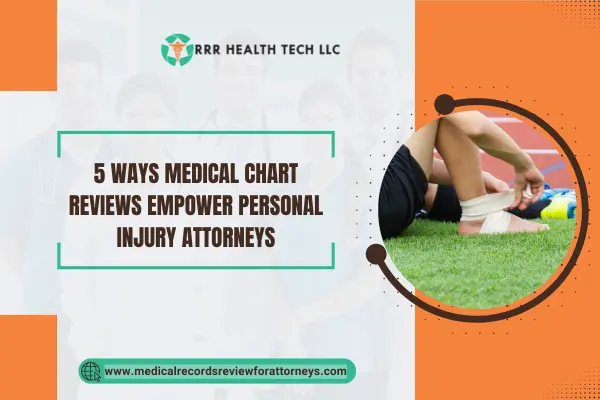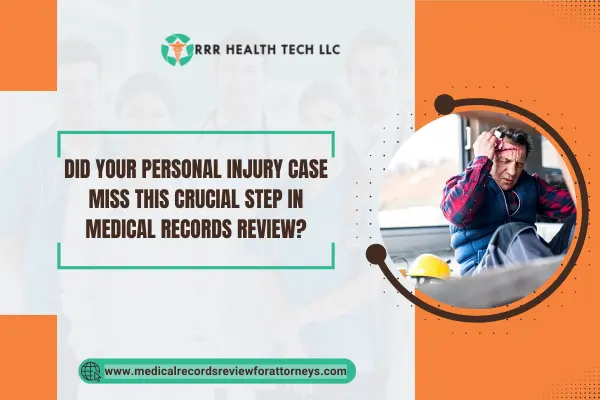
Introduction
The impact of a car accident can be catastrophic, especially for a child. While the physical aspects of the accident may heal over time, the mental wounds can last a lifetime and may result to PTSD. This article outlines what every attorney needs to know about child PTSD in relation to car accidents, the medical records review process for legal cases, and practical ways to assist affected families.
What is PTSD in Children?
• Definition: PTSD is a psychological disorder that can develop following the experience, or witnessing, of a traumatic event.
• Symptoms: While some symptoms may overlap with those observed in adult patients with PTSD, children have unique symptoms as well. These include:
• Terrifying memories that manifest as flashbacks or nightmares.
• Reminders of the accident being identified and avoided.
• Heightened soreness such as increased irritability or alertness.
• Loss of emotional responsiveness.
• Regression to behaviors from earlier developmental stages.
Why Car Accidents Can Cause PTSD in Children
• Traumatic Experience: Life-threatening situations, such as a car accident, can be deeply scarring for a child’s mental wellbeing as it can be their first experience.
• Factors Influencing PTSD Development:
• Crash severity.
• Injury or death of witnesses.
• Parental separation during or after the ordeal.
• Existing mental health conditions.
Recognizing the Warning Signs of PTSD in Children
Most Typical Issues:
Trauma Recollection
• Intrusive thoughts or nightmares.
• Drawing the incident or re-enacting it.
Avoidant Behaviour
• Disinterest in taking car rides.
• A voidance of locations linked to the accident.
Heightened Arousal
• Concentration and sleep issues.
• Increased reaction to unexpected stimuli.
Feeling Detached
• Emotional withdrawal from family and friends.
• Loss of interest in hobbies and favorite pastimes.
Reversion
• Bedwetting or thumb-sucking for younger children.
Complaints without Associated Medical Issues
• Headaches or stomach-aches along with other physical symptoms without clear medical rationale.
Time to Contact Professionals
• When the Symptoms Become a Problem: If symptoms persist beyond a couple of weeks, seeking assistance from a child psychologist or paediatrician becomes imperative.
• Relevant Symptoms Include:
• Increased occurrence of nightmares and problems with sleeping.
• Isolation from academic activities and friends.
• Exhibiting anxiety or depressed behaviour
Helping Your Child Emotionally Heal
Active Role from Parents:
• Minimize Distracting Hazards: Reassure your child of their safety and provide emotional support.
• Help Encourage Self-Expression: Let them process their emotions and feelings in their own way.
• Self-containment: Children tend to stay calm and cope mentally in consistent daily routines.
• Active Guidance: Encourage them not to watch news featuring details of tragedies or accidents.
Model Healthy Coping: Employ positive coping behaviors alongside self-care practices.
Legal and Financial Support after a Car Crash
Role of Attorneys in PTSD Cases
Collecting Evidence: Attorneys collect essential evidence such as medical documents and psychological evaluations, which aid the claims attested to support.
Assessing Damages: Comprehending the totality of PTSD’s impact, including its non-financial effects like pain and suffering
Insurance Settlement Negotiations: Arguing for just payment concerning the emotional and psychological injuries sustained.
Case Studies
Case Study 1: Overview of the Case
Synopsis: A 7 year old child is an involuntary participant in a rear-end collision.
Challenges: Set forth by the family, the child was severely anxious and refused to enter any vehicle at all.
Solution: Referred a child clinical psychologist who specialized in trauma and commenced therapy with the child.
Compensation: The family was compensated for therapy costs as well as emotional distress.
Case Study 2: Overview of the Case
Synopsis: A 10-year-old girl who witnessed a fatal accident while being driven in a vehicle.
Challenges: The child developed PTSD, and symptoms included nightmares and avoidant behaviour toward the incident and associated stimuli.
Solutions: The attorney managed to coordinate mental health professionals who successfully capture the impact mentally and socially concerned into the case.
Compensation: Obtained a settlement that included optimal therapy and medical care for other ailments in paid.
Conclusion
It is very important to identify and resolve PTSD in children developing after a car accident due to its aftermath on the child’s well-being. Lawyers help by guiding families through the legal avenues and make sure that legal redress is provided for the psychological injury alongside any other compensation. By knowing the symptoms and the appropriate materials, we can assist in making children feel safe again and overcoming their trauma.


